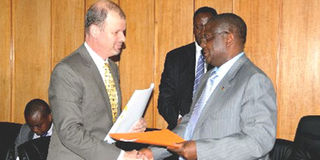Deal on Sh25bn double decker road and new by-passes signed

Finance Minister Njeru Githae and World Bank Country Director Johannes Zutt at Treasury on June 21, 2012. With them is Mr Jackson Kinyanjui. Photo/LAWRENCE MAINGI/FILE/
What you need to know:
- The signing of the loan, which was approved in August by the World Bank board, means the government can now issue tender notices for the road construction.
- The double decker road will run from Nyayo National Stadium — connecting Mombasa Road to Westlands roundabout. It is likely to end what has become a nightmare section for motorists in Nairobi, owing to congestion.
- The money will also be used to expand Waiyaki Way up to Rironi to create an extra lane for commuter buses.
Construction of Kenya’s first double decker road moved closer to reality with the signing of Sh25.5 billion loan agreement between the government and World Bank.
The signing of the loan, which was approved in August by the World Bank board, means the government can now issue tender notices for the road construction.
The double decker road will run from Nyayo National Stadium — connecting Mombasa Road to Westlands roundabout. It is likely to end what has become a nightmare section for motorists in Nairobi, owing to congestion.
The money will also be used to expand Waiyaki Way up to Rironi to create an extra lane for commuter buses.
“The project will lay the foundation for development of mass transit systems that will benefit the low-income population in Nairobi and beyond,” Finance minister Njeru Githae said.
The government will contribute $113 million (Sh9.5 billion) as partner funds. Part of the money will go to Kisumu and Meru to construct by-passes to ease congestion in the two municipalities.
It will also support reforms that will enable the private sector to operate commuter rail and high capacity buses on a bus-rapid transit system.
The new credit brings the total amount of funds from the World Bank to $3.7 billion (Sh314.9 billion).
The minister said the funds were provided on concessional terms, at an interest rate of 0.75 per cent, with a grace period of 10 years and a repayment period of 30 years.
The project, he added, will help ease congestion on the Northern Corridor that passes through Nairobi while facilitating faster movement of traffic from the suburbs to the city.
“As you are aware, the urban transition is fast. In 2011, 30 per cent of the population or 15.2 million people were residing in urban areas. It is projected that by 2030, the population will be 61 million, and half the number will be in urban areas,” Mr Githae said.
World Bank country director Johannes Zutt said Nairobi was in transition and needed modern commuter systems for it to remain favourable as a business hub.
“Developing countries like Colombia, Mexico and Nigeria have embraced mass public transport systems as they transition to middle-income status. It is now time for Kenya to follow their example,” he said.




